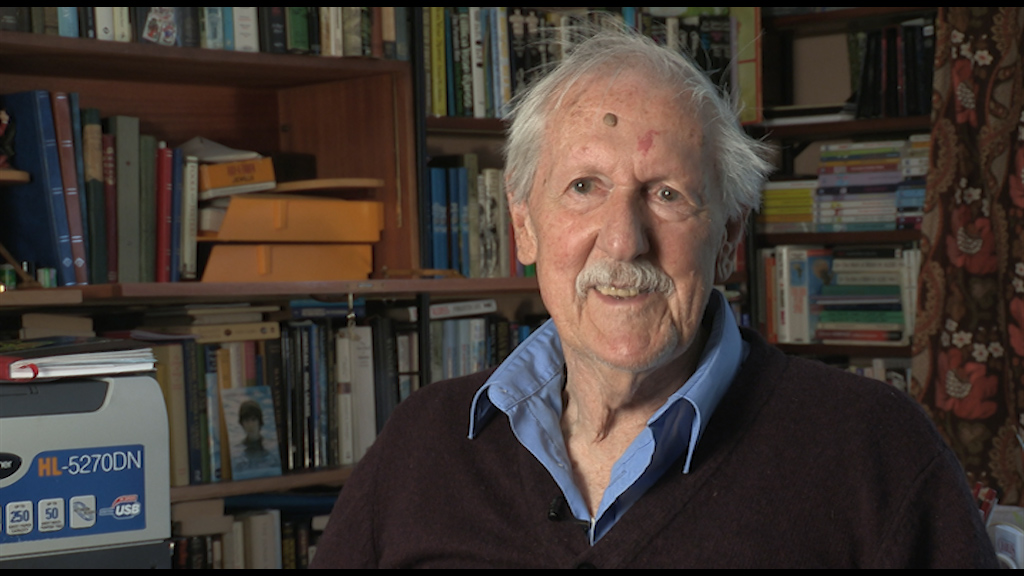NEXT STORY

Without science fiction there’d be no Bovril
RELATED STORIES

NEXT STORY

Without science fiction there’d be no Bovril
RELATED STORIES


|
Views | Duration | |
|---|---|---|---|
| 61. Hidden treasures of Serbia | 53 | 02:44 | |
| 62. Lord Byron’s legacy to Montenegro | 51 | 02:09 | |
| 63. Nocturnal yodelling on the island of Mljet | 29 | 02:15 | |
| 64. The Englishman’s aversion to science fiction | 53 | 04:12 | |
| 65. Without science fiction there’d be no Bovril | 70 | 03:25 | |
| 66. More on Billion Year Spree | 48 | 04:33 | |
| 67. Stanley Kubrick’s house | 313 | 03:46 | |
| 68. Working with a genius | 218 | 02:43 | |
| 69. Stanley Kubrick sets the bar high | 154 | 03:56 | |
| 70. Steven Spielberg steps into the breach | 116 | 02:58 |


Before we… before we ever went, I found, here in Oxford, a woman called Myrta. And Myrta was a Croat and she taught me to speak Croatian. And actually, while we were in Yugoslavia, we went to see her parents; they were very pleasant, too. But it was such a help to be able to speak the language because… well, because no one spoke English. And also, Myrta was good at teaching us the swear words such as Jebem te sunce! Which meant ah, fuck the sun! Jebem te sunce! Wonderful Serbian swear word.
So there we were. So then, of course, I married Margaret and things went well enough for quite a while. And what did we do? Well, we slowly grew less insubstantial financially, and things seemed to be going okay. My book seemed to be reasonably liked, but I always found there was a difficulty in this country, because I wrote science fiction and there was a prejudice against it, and I believe there still is. But what should one say about that? If one went to the USA, as I did regularly, there the atmosphere was much pleasanter. But, you see, the USA had been a jumble of states and then the time had come when the engineers got together and built a railroad from the west and from the east and eventually the day came when they joined and it became the United States and that was a great difference, and a film was made of that moment. I can't remember what the film was now, but certainly it was a big movie. OK. And so the engineers were greatly regarded.
Now in England, when engineers tried to build the railways, they, in many cases, interfered with the men who owned the landscape and who wouldn't have their landscape spoiled by the railroad. We've seen that this very year with this railroad that went strictly along the cliff edge... where was that? Down in Cornwall? There was no secret about this – they were forced to run there because they weren't allowed to ruin some blighter's landscape. And so, I think there's a degree of aversion to engineering and to science, I don't know. Anyhow, I think I suffer from that a bit. But, you know, you go on doing what you can do… what you can do, or indeed, in many cases, what you think you can't do.
Brian Aldiss (1925-2017) was an English writer and anthologies editor, best known for his science fiction novels and short stories. He was educated at Framlingham College, Suffolk, and West Buckland School, Devon, and served in the Royal Signals between 1943-1947. After leaving the army, Aldiss worked as a bookseller in Oxford, an experience which provided the setting for his first book, 'The Brightfount Diaries' (1955). His first science fiction novel, 'Non-Stop', was published in 1958 while he was working as literary editor of the 'Oxford Mail'. His many prize-winning science fiction titles include 'Hothouse' (1962), which won the Hugo Award, 'The Saliva Tree' (1966), which was awarded the Nebula, and 'Helliconia Spring' (1982), which won both the British Science Fiction Association Award and the John W Campbell Memorial Award. Several of his books have been adapted for the cinema. His story, 'Supertoys Last All Summer Long', was adapted and released as the film 'AI' in 2001. His book 'Jocasta' (2005), is a reworking of Sophocles' classic Theban plays, 'Oedipus Rex' and 'Antigone'.
Title: The Englishman’s aversion to science fiction
Listeners: Christopher Sykes
Christopher Sykes is an independent documentary producer who has made a number of films about science and scientists for BBC TV, Channel Four, and PBS.
Tags: Croatian, swear words, marriage, science fiction, engineering, railway
Duration: 4 minutes, 12 seconds
Date story recorded: September 2014
Date story went live: 17 August 2015